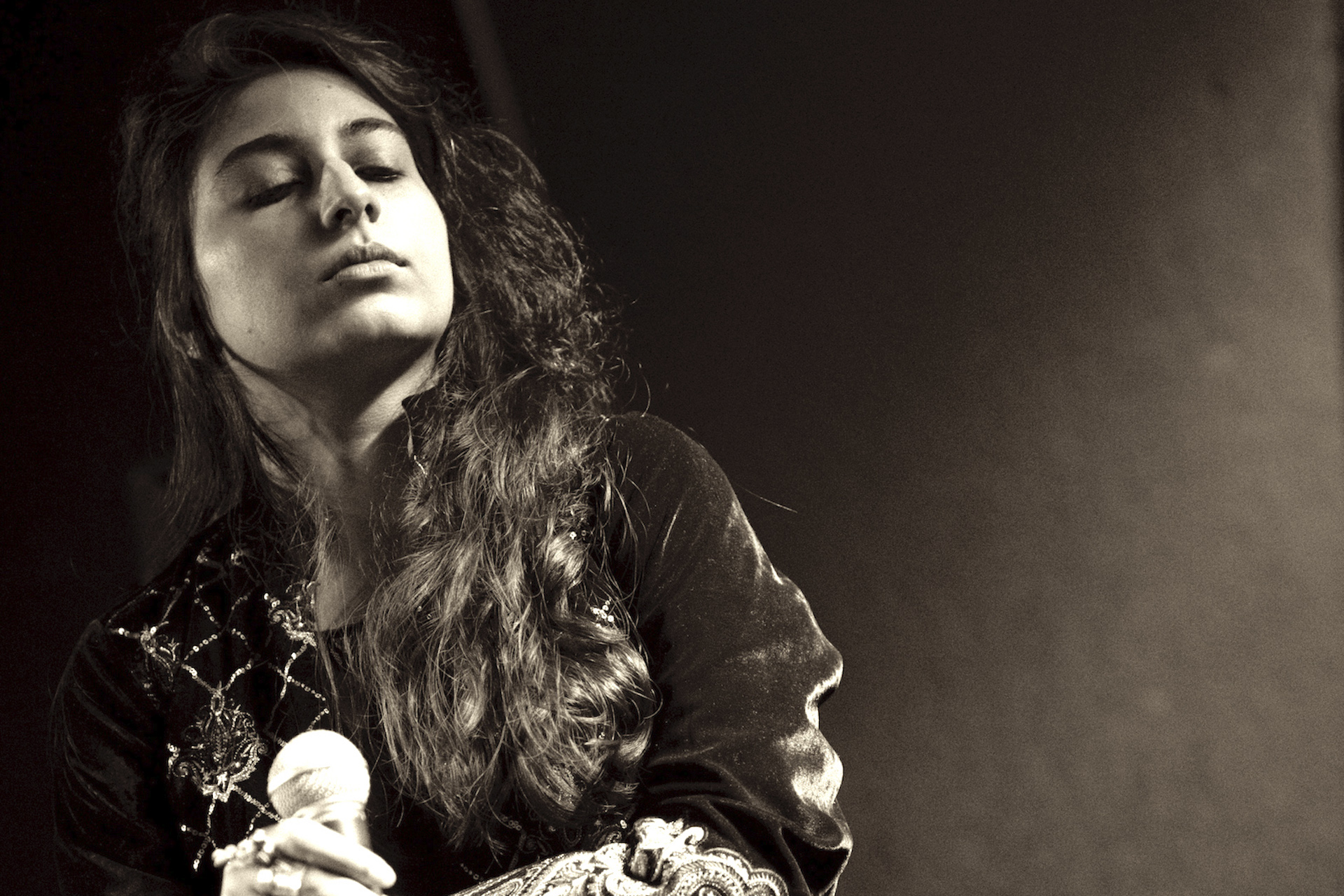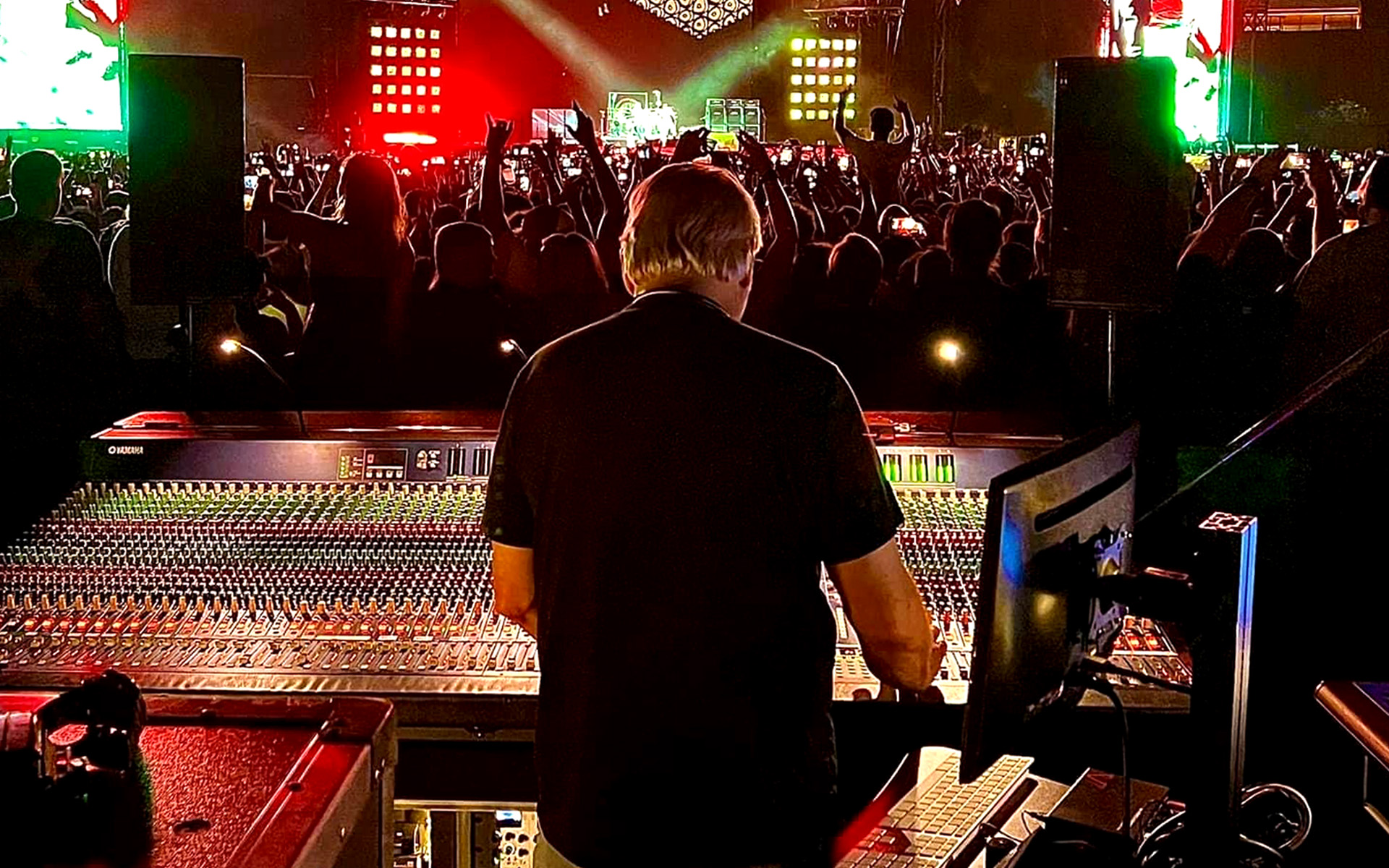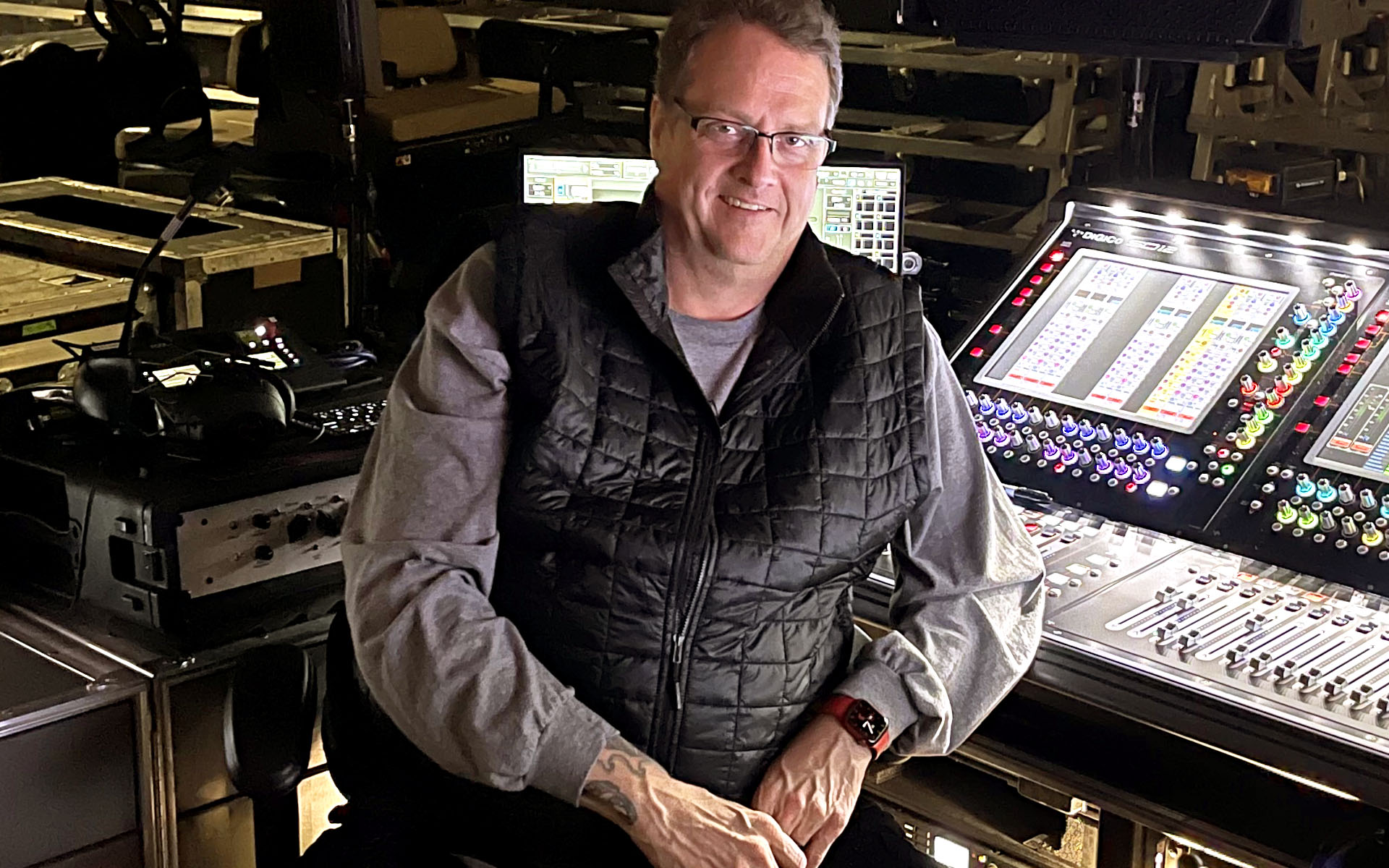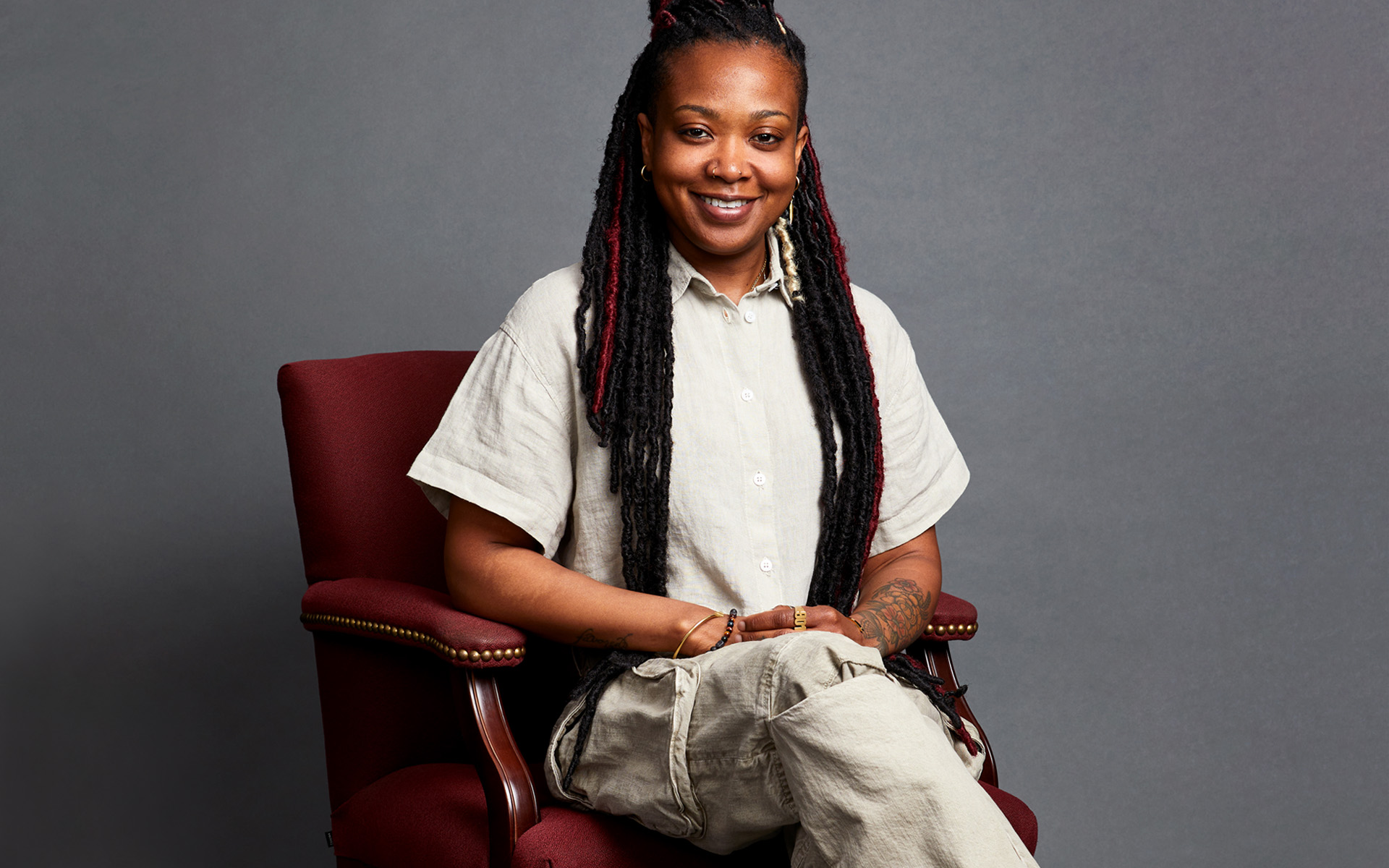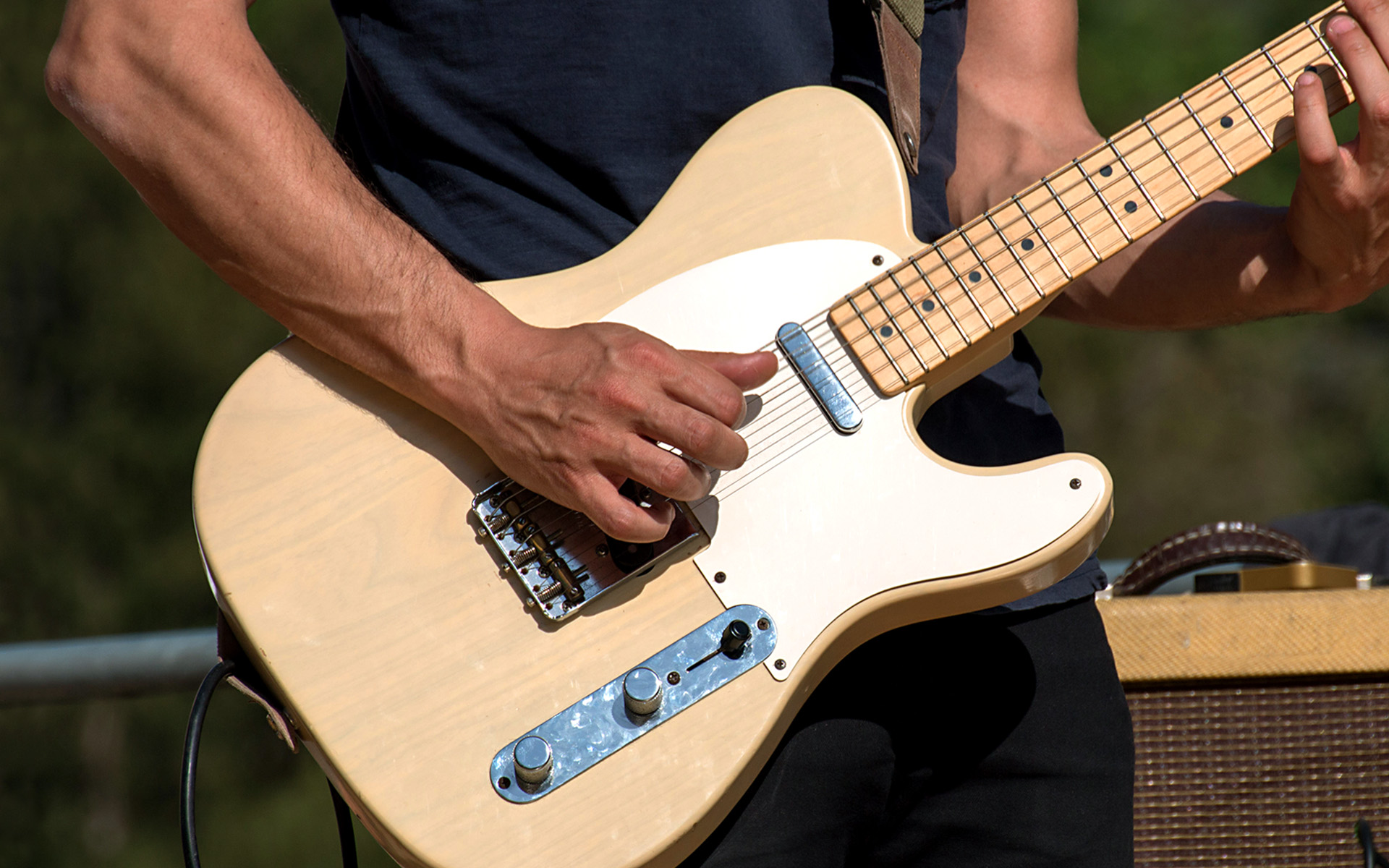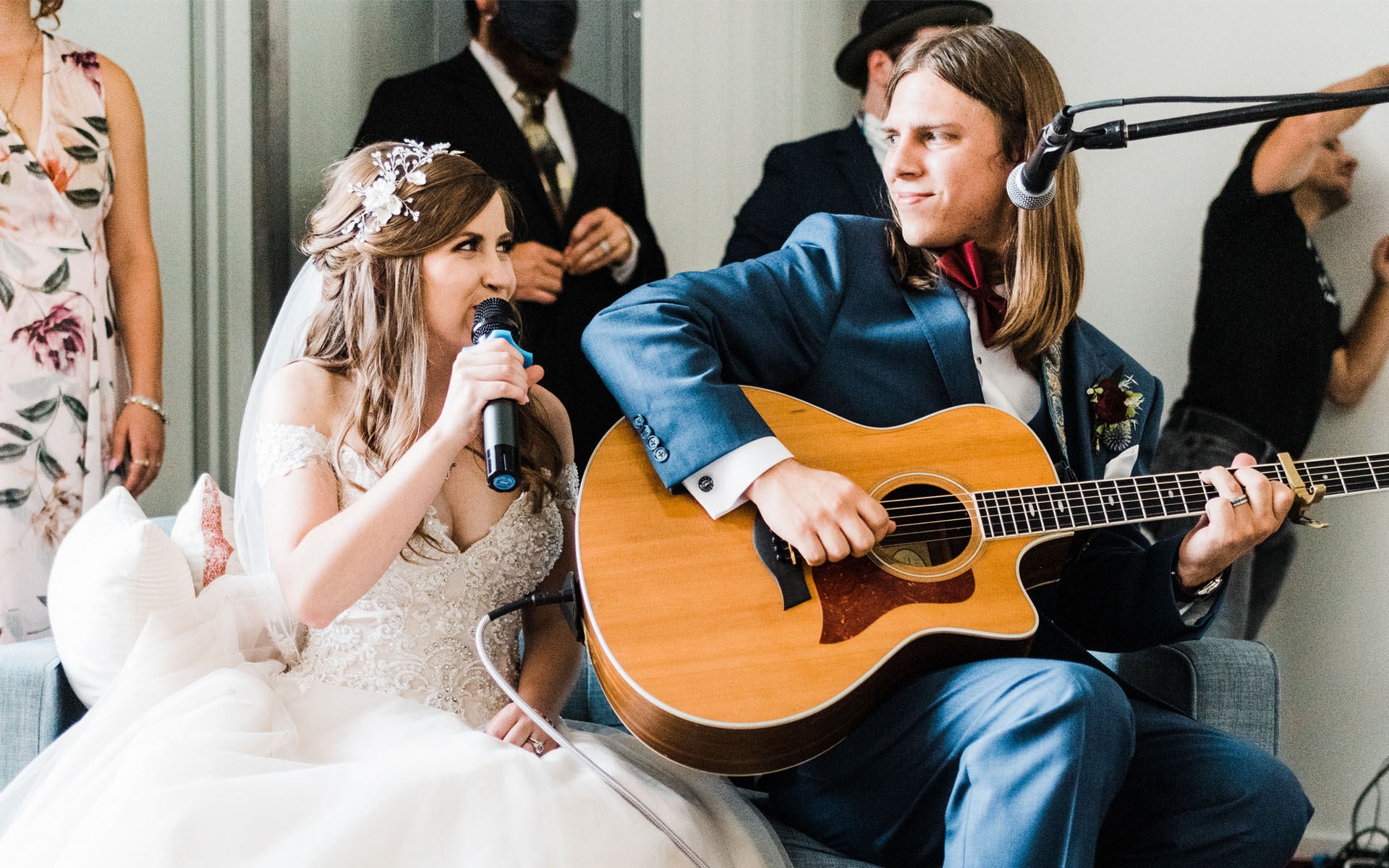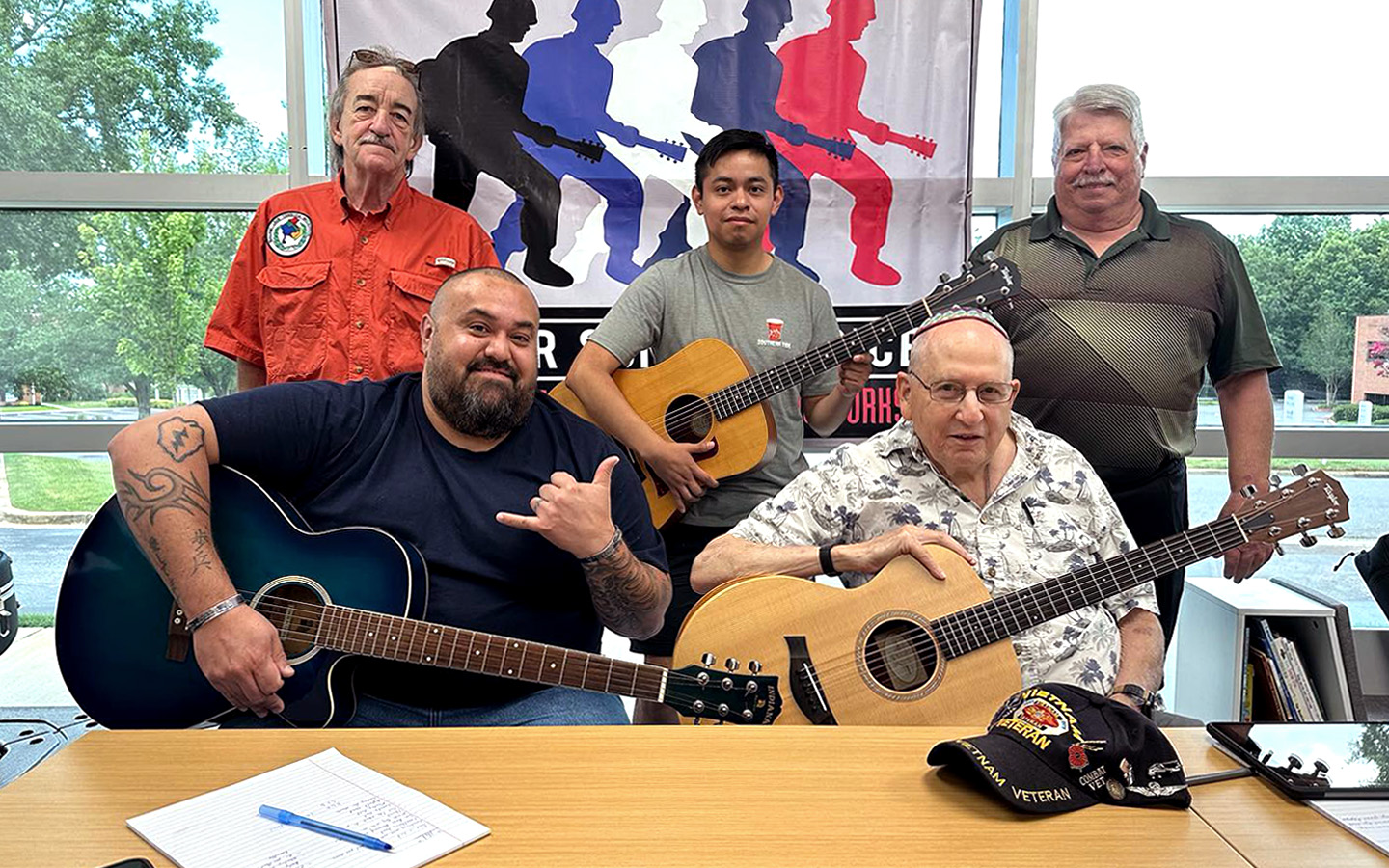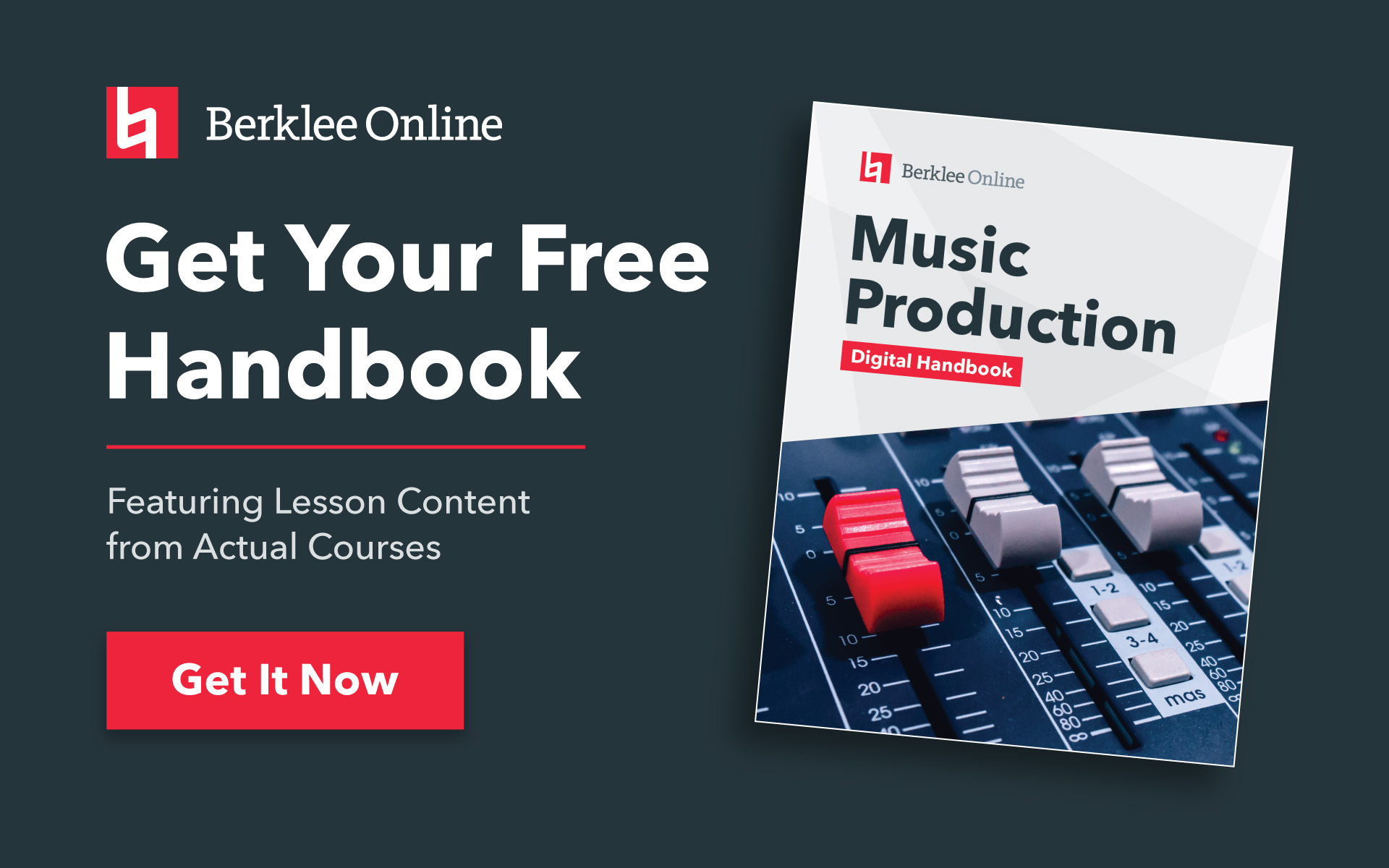Toby Francis is a front of house engineer who has worked with stadium-level artists such as Ariana Grande, Aerosmith, Justin Bieber, Katy Perry, Kanye West, and so many more. While he was writing his excellent Live Event Sound Engineering and Concert Production 101 course for the past six months, he was touring with Red Hot Chili Peppers, which meant that he wrote outside of the US work hours that many of us at Berklee Online keep, and as I was editing his course, we were often ships passing in the night of the Google doc, and didn’t get a chance to connect on a personal level. Yet what he shares in his course is not only terrific technical advice for setting up sound for musicians in almost any sized venue, but the course material is also rife with anecdotes from his decades of experience with some of your favorite musicians. So after the first semester of the course concluded, I wanted to get him on a Zoom call for a few follow-up questions. We had blocked off an hour for the call, but it ended up being closer to two. Here are some of the highlights.
On how he landed the FOH engineer gig with the current Red Hot Chili Peppers Unlimited Love tour:
I had been talking to the Peppers for like five years. They reached out and wanted some help with some stuff, which eventually led to me having this job. So this tour is the first time I’ve actually worked for them. I’ve worked with their production manager and their tour manager off and on for quite a while, and they’re the ones that brought me to the band’s attention. It was a strange process: Interviewing for this band was one of the weirdest I’ve ever experienced, but also one of the coolest. They’re a true band, all four guys have a say in everything.
The tour manager talked to me. We talked about what the deal would look like if I did it. The production manager talked to me about what equipment we would use and on and on. And then I was supposed to go interview with each of the four band guys, starting with Chad [Smith, drummer]. I went to Chad’s house in Malibu and we talked about music for three hours. We started out talking about drums, which led to drummers, the drummers that had impressed me and why. And we talked about Frank Zappa for probably two of those three hours.
By the end of the three hours, he said, “Look, this is great. I hope it works out.” So on the drive back over, the tour manager called me and he goes, “don’t worry about meeting the other guys tomorrow. Chad called them and said that you’re the guy.” He pitched me to them and they all signed off on it.
I started talking to John [Frusciante, guitarist] regularly right after that. He wanted to feel me out and see what I thought sounded good, and what didn’t sound good. John’s kind of the heart and soul of this band right now; he’s very involved in the overall approach that we took. I mean, we’re mixing analog at his request. He basically told us we could do whatever, just make it sound as good as that band can sound to stay true to the records, which hadn’t been the approach they had taken over the years. I think he had realized that technology exists now where you can really replicate a record sound in a large live event like that; the speaker systems will do it now. And I haven’t mixed analog in probably 12 or 13 years; I mixed a Prince tour where he was adamant it be done that way, which was also weird because he chose all the gear and we had to make it work to his liking. But I’ve learned from that and I’ve also learned so much from John and what he’s tasked me to do. I’ve learned through that process.
On his relationship with mixing consoles and how it has changed with the advent of new technology:
It’s so easy for people to get complacent in this field. At a festival the other day, some guy told me he was an Avid man. So I went, “Well, what exactly does that mean?” And he said, “Well, I only use Avid consoles.” And I go, “Wow, why? Why would you do that? … Why would you limit yourself? Are you that blown away by what they have to offer? Or are you just doing the same thing all the time anyway? And that makes it easier for you to do?”
Which I think he kind of took offense to! But honestly, I think he took offense to it because I nailed it. And a lot of people are like that. Don’t get me wrong, there are people that use the same console all the time and get absolutely amazing results. They do it because they want to totally know everything it can do and take it to its limits. I just don’t really usually approach it that way. I did at one point because there weren’t as many options 10 years ago. If you could find one digital console option that you could actually rely on, that was a big deal, and I chose reliability over everything back then. Because what I learned very early on with digital consoles is that those things don’t always turn on.
On what happens when your console freezes during a sound engineering gig:
I had one console stop functioning as I was in the show, and you can’t unfreeze it without turning it off and back on. Luckily it was a couple songs before the end, and enough stuff was on—I mean, it was presentable and it was better than interrupting the whole show—but that really scared me. And I’ve reacted to every big failure. Like I had a DiGiCo-SD7 fail twice in shows, and once it shut down completely at an Ariana Grande show. The console just died.
It’s very rare to have a backup system for that sort of thing. I’ve seen people take mixes for monitors and put it in the PA, but honestly it sounds horrible. When you do that, you’re better off to just stop, fix the problem, and resume the show, which is what we did. But they couldn’t get it to come back on! I honestly punched the back of it in anger. And it pushed the card back in and the console came back on. Ari’s mom was standing there and saw that and went “Thank God you knew what to do!” I didn’t have the heart to tell her that I didn’t know what to do. I Fonz-ed it back in!
On what he did after the second time his console froze (which happened during a Katy Perry set at Glastonbury):
I ended up with a Yamaha Rivage console, but I went to DiGiCo’s shop in England and met with James Gordon, the guy that runs the whole company now, and said, “Look, you’ve gotta fix this problem. Here’s a list of failures.” This is the most popular console brand amongst any of the top level mixers, but I just left because I can’t sleep at night knowing that this might happen to me again. I don’t know if I can ever be convinced enough to trust it. So I just pushed him hard to ensure they’d fix it. And they worked on the three issues that we had identified, which they did indeed fix.
The new version of the console is very reliable. And I have started using them again when it’s the best option. Like the Kanye West stuff I’ve done. Some of that was well over 200 input channels, and it’s the easiest console to do something like that. You don’t always have the time to do stuff in advance. I have done a lot of stuff on the fly with him. We did the DMX funeral. There’s a livestream of it if you go on YouTube. We started probably two hours before we should have. We hadn’t checked anything. I had literally checked the two principle vocal mics when we started the show, and you hear the mix come together. There’s over 100 choir members individually miked and a huge band. It was almost 200 inputs, but just with copying and pasting and knowing how to do that stuff on that desk, it was shocking how fast it came together. I listened to it too after. It’s hard to hear your work when it’s not right, but it was interesting to hear it become right.
On how being an FOH engineer can carry other risks as well: [Trigger warning: this next passage contains descriptions of violence and death.]
I was at Astroworld in Texas. For two hours I thought we were all gonna die. Honestly, it was so out of control. There was no security at all, and a crowd just out of their minds with rage. I think my count now is up to 37 people I’ve seen perish at concerts I was involved in. But Astroworld, that’s 10 in one event.
When I was touring with Guns N’ Roses, we had a meeting every night for what we were going to do when the wheels came off, an evacuation plan. I worked for Aerosmith when GnR just started and we had a few incidents on that tour because of their audience: the excitement of them being new and the record being big. And it’s just like sports, the fans. “Fan” is short for “fanatic.” People think that “fan” is a great word. Well, “fanatic” is not really a good word, or a good label to put on somebody. And if you have thousands of fanatics, all worked up over something . . . what I don’t like about it is how helpless that makes you feel, to help others or to be able to protect yourself. In that situation, I’ve been hit with thrown items. You know, I got hit with a bottle in the back of the head at the first note of the Skid Row “Slave to the Grind” tour. The very first downbeat I got hit in the back of the head with a bottle that broke on me. It was thrown hard enough to break when it hit me. Then I had to do the show with blood pouring down my back.
Live Event Sound Engineering and Concert Production 101 excerpt:
Let me share with you a story of how my career was helped by people you wouldn’t think would be in the position to do so. I was put in the odd position to mix two large shows for Aerosmith in the mid 1980s. The band had stopped a tour early due to substance abuse problems. To make some fast cash to hold them over through the recording of their next record, they had agreed to do two stadium shows in the New England area: Syracuse in New York first, then Sullivan Stadium in Foxboro, Mass., which is now where a venue called Gillette Stadium has been built in its place.
Aerosmith’s regular FOH engineer was not available and due to the band’s very well known substance abuse issues, none of the established engineers they had used in the past wanted anything to do with them. Because I had recorded them several times in the studio I was asked to mix those two live shows. I had never mixed sound in an arena or stadium in my career, so I simplified the approach to something I felt I could handle and did the best job I was capable of doing.
I was nervous—as you would imagine—but managed to do what I felt was a good solid mix. After the first show, as soon as the house lights came on, I was summoned to the dressing room. I wasn’t sure if this was a good or bad sign being called in so quickly. As it turned out Joe Perry’s mother had met the band coming off the stage and had told them it was the best sounding show she had ever heard them do. And being Joe’s mother, she had been to lots of their shows.
To make a long story short(er), the band sobered up, became very successful for a second time, and I became their FOH mixer. That began my career of being asked to mix bands like Guns N’ Roses, Smashing Pumpkins, KISS, ZZ Top, and on and on. All because Joe Perry’s mother not only liked my work, but also because she had the band’s ear. So my advice is to do as good a job as possible and be nice to everyone.
On his original career aspirations:
I’d wanted to be in the military my whole life, growing up. I had a grandfather that was a career military officer, and I wanted to emulate him, and this was just post-Vietnam. They stopped sending people over, I think in 1971 or ’72. And this was about ’74 when this conversation took place. And he told me “don’t do it,” and if I was expecting the experience he’d had, I would be very disappointed. The world was not the same. And he compelled me to pick something else.
I loved school band; I played trumpet. I was a horrible trumpet player. But I loved the whole band experience, the large group of people performing together, each doing their little part. And I particularly loved to conduct the band, which I was fortunate enough that the teacher liked to let students do, which means he didn’t really want to. Since nobody else wanted to do it, I got to do it a lot. And honestly what introduced me to the concept of sound engineering was literally that. Because when you’re the conductor, if you’re really good, you’re mixing the show too. You create the stereo spread and how you place everything, the arrangement. All in all, the end result is a mixed, mastered, audio experience and performance.
On how he got into live sound engineering:
I started working for a local band not long after that, just carrying gear around and the guy that mixed that band, his name was Rick Watts. His nickname was Hundred Watts, because in 1974, a hundred watts was a lot of power. If he lived today, he’d be Thousand Watts. But he was very knowledgeable, a really good teacher.
He taught me some of the basic points we emphasized through the Live Event Sound Engineering course, like phase coherence, and the fact that it’s time-based. Rick told me that stuff. I didn’t hear anybody else talk to me like that for the next 15 years. I started reading about it, but still it was the era that I came up in that was so different. You did not have schools that specialized in anything to do with sound engineering other than NYU. They had a program, but it wasn’t aimed at live music. Live sound was frowned upon because it was so primitive in nature and the limitations were such that the Beatles stopped touring because technology did not exist to present them in an acceptable way. Anybody that says they heard the Beatles at Shea Stadium is lying. No one heard the Beatles at Shea Stadium. They heard screaming.
On the double-edged sword of success in the field of sound engineering:
What’s horrible about this career is that the better you do, the worse it gets and the harder your job becomes. We’re playing festivals and stadiums on this leg of the Red Hot Chili Peppers tour and we get into the big open fields like the last show we did, and it’s crazy how good it sounds, like all the detail that’s in there. Because you lose some of that in the bigger rooms. But like I was saying, the still level of clarity is so much higher now with all the modern PAs, if you deploy it the right way. But with Watts helping me understand that it’s time-based and the role that time plays in the entire process makes it so much easier. I know people that have whole careers who never completely grasp that part of it.
It makes tuning the PA easier, deploying the PA. And every part of it becomes easier when you gain that understanding. I remember when I started time-aligning the subs to the PA and how much tighter it sounded. And other engineers, they’d be looking at the console and I’m like, “God there’s nothing on the console that can create what you’re hearing.” Because before that people either physically placed them where they were somewhat time-aligned, or they just ignored it. And most people ignored it. But most of the PAs were breaking every rule that we live by now.
And I kept having experiences that backed up the concepts that Rick had instilled in me. And it was all pretty basic stuff because back then digital did not exist in audio at all. If you were time-delaying something, you were using a tape machine to create the delay.
On how he creates a solid relationship with the artists who he works with:
As early in the process as possible, I try to convince everybody involved that I care as much about it as they do. When we first start rehearsing, I always like to record. I multitrack the performance, but I don’t go to my console. I sit as close as I can to the band and I watch what they’re doing. I watch how the drummer fidgets, what they like to do, and their nervous habits. And they all have nervous habits! So I kind of identify what that is and I can tell by the fidgeting what they’re really concerned with. With a lot of them it’s either the snare drum or certain cymbals: they fixate on the weirdest things and that becomes incredibly important to their process. And if I pinpoint enough of those details to initiate the conversations, they know really quickly that I know quite a bit about whatever it is they’re doing.
So by the end of the first week, we’re pretty much solidifying the relationships so we then can really start getting work done. And then if I need them to do something a little bit differently to help the end result, they’ll do it.
On how the relationship-building he has done over the years has resonated across his teaching in Live Event Sound Engineering:
I’ve enjoyed this teaching more than I ever would have imagined. I’m really looking forward to this semester because I’ll have more time to interact in the discussions and kind of nudge people. And I was shocked at how good some of the students were. One of the students was like “God, this was so hard. I hope this is even presentable.” When I graded it, I told her “What are you saying? This is probably the best mix. You’re being too hard on yourself. Don’t stop. Because it’s working.”
On balancing work life and home life when the work life of a FOH engineer requires him to be away from home for extended periods:
I feel that I’m an advocate for the audience and for the band’s creative vision. But I also have to be an advocate for myself and for my family. If I knew what I know now 50 years ago when I was starting the journey, I would take a different journey. My loved ones have paid the price for this.
On how having his wife—tour accountant Gwen MacQueen—on the road has been helpful, but he still takes work home with him, even if home isn’t, well, home:
Even now that I work with my wife, I’m lucky enough to not be away from her, but I bring work home to me. If I’m struggling with something, it shows, I get distant. I put a lot into that. It’s the nature of it. You kind of have to, and each person does it differently. And I’m sure there’s people who do it that don’t have any of those side effects, but just from my experience in it, I would wish that I could have done it differently so I wasn’t away and distant as much as I’ve been because of the responsibilities. I mean, there are projects I’ve done with Kanye where I was awake for days at a time. Because we were doing it so last-minute and then we had to start the show at a point of complete mental exhaustion.
On Kanye West:
That’s a tricky subject. There’s more to what happened than what the public is aware of. I don’t want to condone in any way anything he said or did, and I was not present for any of that, nor would I have wanted to be. That’s not the person that I got to know when I worked there, and I do not believe that he truly feels that way. He’s probably the most generous person that I’ve known in my life. I’ve seen Kanye personally give away more money and goods and services than anyone, and when the pandemic first hit, Kanye was the first celebrity I know that got Covid because he was downtown, passing out food to the homeless once he realized who was really going to have the hardest time with the pandemic. He took a million dollars worth of goods and stuff that was needed and personally distributed it and then ended up in the hospital sick.
On maintaining variety in who he will do sound engineering for:
I have a vast bag of tricks that I draw from. I see it as detrimental to your career to be typecast in any way. If your drums always sound a certain way, well they may not work with certain genres. A rock drum sound and an R&B drum sound are totally different. And all of those minute details matter. So you’ve got to be respectful of literally every aspect of it. And it’s a lot to manage.
On why the music still matters to him all of these years later:
A song resonates with each person in a different way. Each song to a degree is an open letter to whoever reads it. And they each get a different meaning out of it. And sometimes that meaning means the world to that person.
On the real value of the live music experience:
I’ll never get tired of experiencing the Chili Peppers. Every show is totally unique. The experience that you get at tonight’s show vs. next week’s vs. a year from now is completely and utterly different, different set list, different solos, different everything. They create a unique experience each time they hit that stage. They know the value of that. And they know the value of that. They’re truly not pandering to the audience in any way. They’re doing what they feel and it upholds their legacy in the right way.
With these older bands there’s a sense of pride at the accomplishment. The older musicians appreciate this on a whole other level because they’ve already accomplished it all. They’ve already met the queen. They’ve already made a quarter of a billion dollars. They’ve already had a yacht. They’ve already had everything that you could ever want. And then they realize that the one thing they won’t be able to buy is that feeling that they get when that spotlight hits them, and the energy of the crowd is totally focused on them. Because that’s the biggest hug you’re ever going to get in your life. And that the older you get, the human side of it becomes so much more important than all of the rest of it.
On what’s next:
My wife, my brother, and I bought a Neumann lathe. I’m gonna learn vinyl mastering and we’re gonna buy some record presses. Start something else interesting that we can keep going and pass this on to our kids. My son is in the business. He plays in a band called Soft Kill. My daughter’s graduating college. She wants to be a music manager, and that she will. I can already tell.




